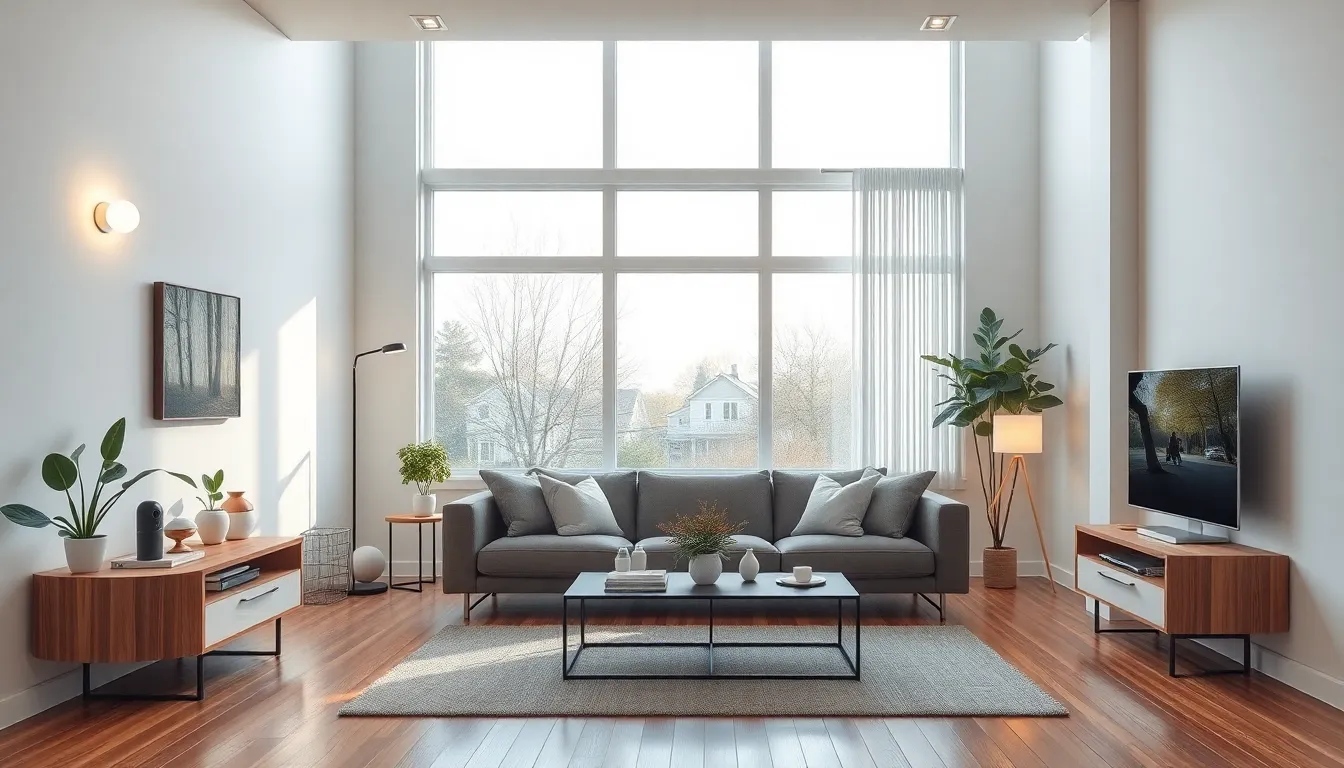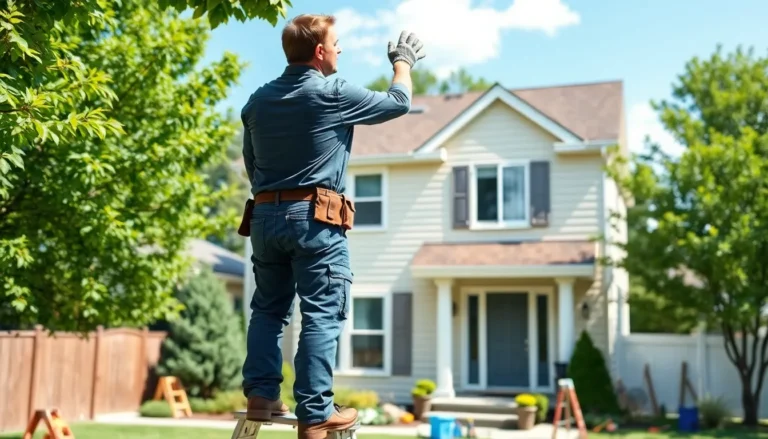Imagine walking into your home and having it greet you like an old friend, lights flickering on, the perfect playlist already humming in the background. Welcome to the world of smart home offerings, where technology meets comfort and convenience. With a simple command or a tap on your phone, you can control everything from your thermostat to your coffee maker.
These gadgets aren’t just for tech enthusiasts anymore; they’re for anyone who wants to make life a little easier. Whether you’re looking to save energy, enhance security, or just impress your friends with your futuristic lifestyle, smart home devices have got you covered. So, sit back, relax, and let’s explore the amazing ways these innovations can turn a regular house into a smart sanctuary.
Table of Contents
ToggleOverview of Smart Home Offerings
Smart home offerings encompass a wide range of devices designed to enhance everyday living. These devices improve convenience through automation and remote control. Examples include smart thermostats that optimize heating and cooling, resulting in energy savings of up to 20%.
Smart lighting systems enable users to adjust brightness and color with voice commands or smartphone apps. Home security features, like smart locks and cameras, provide real-time monitoring and alerts, contributing to enhanced safety. Voice assistants streamline operations, allowing users to control multiple devices using simple phrases.
Integration of devices across various platforms provides seamless functionality. For instance, smart hubs can connect different products, facilitating centralized control. Users can create automation routines that trigger several actions simultaneously, such as locking doors and turning off lights at bedtime.
Smart appliances also play a significant role in home management. Refrigerators can monitor food inventory, while washing machines can be programmed for optimal performance. Energy-efficient appliances reduce utility bills, aligning with environmental goals.
In terms of accessibility, these smart offerings cater to diverse demographics. Easy-to-use interfaces appeal to non-tech-savvy individuals. Additionally, the ability to customize settings enhances user experience, ensuring gadgets meet individual preferences.
Flexibility remains a key feature of smart homes. Homeowners can start small, gradually adding devices as needed. This approach makes smart technology attainable, allowing anyone to enjoy its benefits. Thus, smart home offerings represent a holistic solution for modern living.
Types of Smart Home Devices

Smart home devices transform living spaces by enhancing convenience and efficiency. Different categories exist, each offering unique features to elevate daily life.
Smart Lighting Solutions
Smart lighting systems provide users with control over their home’s ambiance. Equipped with voice activation, these systems allow for easy adjustments to brightness and color. Programmable schedules enable automatic on and off times, optimizing energy usage. Many smart lights integrate with home assistants, allowing for seamless control from anywhere. Popular options include Philips Hue and LIFX, which cater to various preferences and needs.
Smart Security Systems
Smart security systems increase home safety through advanced technology. High-definition cameras monitor property in real-time, sending alerts to users when detecting movement. Smart locks enhance access control, enabling remote locking and unlocking via smartphones. Devices like the Ring Video Doorbell and Nest Secure provide comprehensive solutions for protecting homes. These tools work cohesively to ensure peace of mind while homeowners are present or away.
Smart Thermostats
Smart thermostats optimize energy consumption, significantly reducing utility bills. Users can program heating and cooling schedules based on their daily routines. Many devices feature learning capabilities, adjusting settings automatically over time for maximum efficiency. Popular models, like the Nest Learning Thermostat and Ecobee, support remote control via mobile apps, allowing temperature adjustments from anywhere. These innovations contribute to energy savings while maintaining comfort throughout the home.
Benefits of Smart Home Offerings
Smart home offerings create an enhanced living experience with numerous advantages that simplify daily tasks while promoting efficiency.
Enhanced Convenience
Convenience plays a central role in smart home offerings. Voice commands allow users to control various devices throughout their homes without moving. Automated schedules help manage household tasks like adjusting thermostats and turning lights on or off. Homeowners can monitor their properties remotely, enabling control from anywhere via smartphones. Smart appliances make organizing daily life easier, from brewing coffee in the morning to setting reminders for grocery shopping. Flexibility in device integration provides a tailored experience, allowing users to customize their routines.
Improved Energy Efficiency
Energy efficiency significantly increases with the implementation of smart home technology. Smart thermostats learn user habits, optimizing heating and cooling according to specific patterns. Monitoring energy usage in real-time provides insights that lead to more informed decisions about consumption. Features like energy-efficient smart bulbs or appliances reduce overall energy waste and lower utility costs. Many systems also send alerts about excessive energy consumption, encouraging users to adjust their habits. With these enhancements, homeowners benefit from a smaller carbon footprint and reduced bills.
Increased Security Features
Smart home offerings bolster security through advanced technological solutions. Security cameras provide live feeds and alerts, ensuring constant vigilance over property. Smart locks enhance entry control, allowing homeowners to manage access remotely. Integration with security systems enables notifications for unusual activity, fostering a proactive approach to safety. Many systems support remote access, letting users monitor their homes when away. Additionally, automation adds a layer of security by simulating occupancy, which deters potential intruders. Overall, these features create a safer living environment for families.
Popular Smart Home Brands
Several brands dominate the smart home market, each offering unique features and innovative solutions. These brands cater to diverse needs, from security to energy efficiency.
Brand A Overview
Brand A specializes in smart security devices. Their product line includes smart cameras and motion detectors that ensure comprehensive safety for homes. Users benefit from features like real-time alerts, two-way audio, and night vision capabilities. The app allows access to camera feeds from anywhere, ensuring peace of mind. Additionally, integration with other smart home devices enhances its utility. Brand A’s focus on security makes it a top choice for homeowners prioritizing safety.
Brand B Overview
Brand B focuses primarily on smart thermostats and energy management systems. Their devices learn user preferences, adjusting temperatures based on patterns, which leads to significant energy savings. Features often include remote temperature control and energy usage reports. Integration with voice assistants enhances usability, allowing for hands-free adjustments. Brand B’s commitment to efficiency appeals to eco-conscious consumers seeking to lower their utility bills and carbon footprints.
Brand C Overview
Brand C excels in smart lighting solutions that transform home environments. User-friendly mobile applications enable customization of lighting schedules and color temperatures. Voice control compatibility makes operation seamless. Furthermore, energy-efficient bulbs help reduce electricity consumption while delivering a range of lighting options. Brand C’s innovative approach to lighting makes it a popular choice for users wanting to enhance ambiance and efficiency in their homes.
Future Trends in Smart Home Technology
Emerging smart home technology trends suggest advancements in artificial intelligence and machine learning. These technologies enhance device responsiveness, enabling homes to learn user preferences over time. Smart home systems will likely become more interconnected, allowing devices to communicate seamlessly across platforms.
Voice-activated controls are expected to grow in sophistication, offering more natural interactions. Innovations in natural language processing could facilitate more intuitive command execution, allowing people to communicate with their devices as they would with another person.
Increased emphasis on energy efficiency is set to drive the development of smarter energy management systems. Smart energy solutions will enable users to monitor and optimize utility usage in real-time. Automation features will likely incorporate renewable energy sources, addressing sustainability concerns more effectively.
Security features will undergo significant enhancements, incorporating advanced biometrics for personalized access control. These upgrades are anticipated to provide stronger protection against unauthorized access, reducing security vulnerabilities. Real-time monitoring systems will continue to evolve, utilizing AI algorithms for predictive analytics to prevent potential threats.
Home health technology is also gaining traction. Achievements in smart health monitoring devices will promote wellness within households, with wearables tracking vital signs and connecting with home systems for alerts. This integration will support proactive health management by alerting users to potential health issues early.
Collaboration between brands is becoming increasingly common, enabling the integration of diverse smart home devices into unified ecosystems. Partnerships among tech companies aim to expand compatibility, improving user experience and expanding the market reach of smart home offerings.
Overall, future trends indicate a more intelligent and harmonized smart home environment, where devices not only respond but also anticipate needs. These advancements promise to transform everyday living, making homes not just smart but intuitive.
Smart home technology is reshaping how people interact with their living spaces. With a diverse range of devices available, homeowners can easily enhance their comfort and security. The ability to automate tasks and manage energy consumption not only simplifies daily routines but also contributes to a more sustainable lifestyle.
As advancements continue to emerge, the integration of artificial intelligence and improved interconnectivity will further elevate the smart home experience. This evolution promises to make homes not just smarter but also more intuitive, catering to the unique needs of every household. Embracing these innovations is a step toward a more efficient and convenient future.




